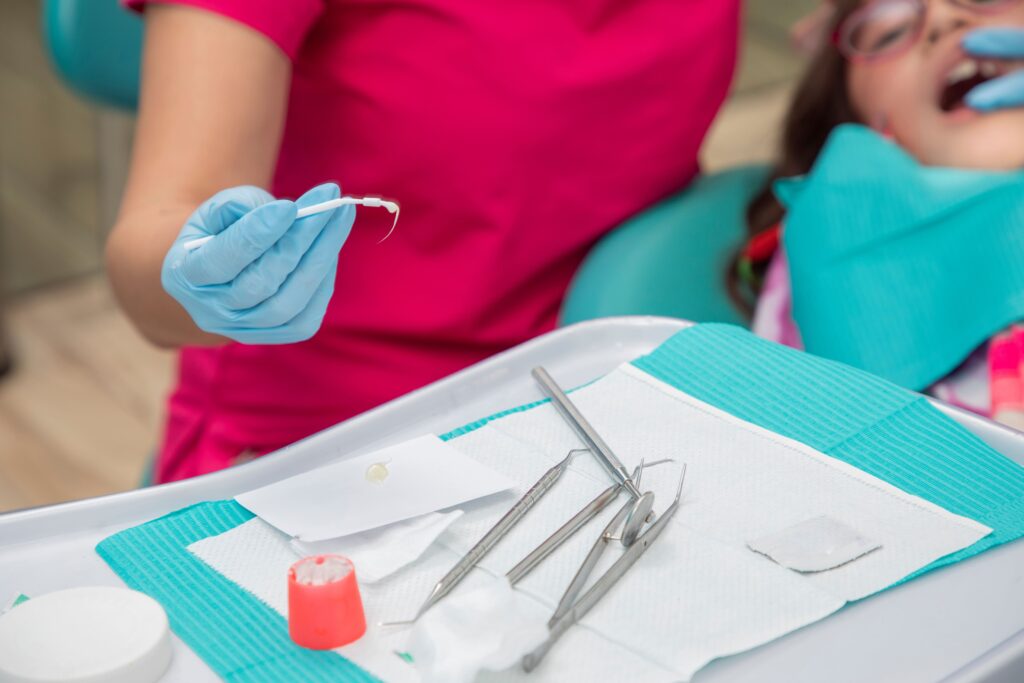Does My Child Need Fluoride Treatments?

At Dentistry for Children, we believe in prevention as the first line of defense against tooth decay and cavities. We are pleased to offer a range of preventive services, including fluoride treatments, to keep your little one’s teeth in tip-top shape. We are all about setting the stage for a lifetime of healthy, happy smiles.
What Is Fluoride?
Fluoride is a naturally occurring mineral found in soil, water, and some food sources. Touted as nature’s cavity fighter, fluoride is known to lower the risk of tooth decay and cavities. Today, most communities offer fluoridated drinking water as a public health measure.
What Are the Benefits of Fluoride for Children?
Dental cavities continue to be the most prevalent yet preventable childhood disease. Left untreated, they can cause severe pain and interfere with eating, potentially resulting in a child not getting the nutrition needed to stay healthy. Tooth pain can also result in lost time from school and even lead to tooth loss. The best way to treat cavities is to prevent them from ever developing.
Years of research and studies show that regular fluoride use is one of the safest and most effective ways to prevent tooth decay in children. The cavity-fighting mineral helps remineralize and strengthen your child’s tooth enamel, protecting the tooth enamel from damage.
Fluoride defends your little one’s smile from acids in the mouth, which can slowly eat away at the tooth enamel. It is also antimicrobial, meaning it reduces the bacteria in the mouth responsible for cavities and gum disease. Better yet, fluoride helps slow down or even reverse the early stages of tooth decay, restoring your child’s healthy smile.
How Does Fluoride Work?
Your little one’s teeth are coated with a protective, hard substance called enamel. Consuming sugary or starchy treats provide cavity-causing bacteria an abundant food source. As they feast, the bacteria produce acids that attack and weaken the tooth enamel by removing some of its mineral content in a process known as demineralization. That is how cavities begin to form.
Fluoride has the unique ability to remineralize the tooth enamel, restoring the minerals stripped by bacteria and acid attacks. This remineralization process reverses the early stages of tooth decay and strengthens the tooth enamel.
Should Your Child Get Fluoride Treatments?
While fluoridated water in our homes usually provides the daily needed amount of fluoride, more and more children are turning to bottled water. That means they are not getting enough fluoride to keep their teeth healthy. A lack of fluoride during the critical growth years can result in extensive tooth decay in infants, toddlers, and young children.
At Dentistry for Children, we typically recommend fluoride varnish starting from the first birthday and every six months from that point on. Our goal is to provide an extra layer of protection against tooth decay and cavities.
What Is the Fluoride Application Procedure?
Fluoride treatment is quick, safe, and painless. Dr. Halum or our dental hygienist will use a small brush to apply the varnish on the entire visible surface of every tooth, including the chewing surfaces and the sides. The process takes a few short minutes to complete from start to finish, leaving your child’s tooth enamel with a cavity-fighting boost.
Your little one can eat and drink right away but will need to wait at least four hours before brushing those pearly whites. So just carry on with your nightly brushing routine.
What Is Dental Fluorosis?
Dental fluorosis is a condition resulting from too much fluoride exposure while the teeth are still forming below the gums. It usually develops before age eight. Fluorosis is mostly a cosmetic concern and is characterized by streaks, pits, and spots forming on your child’s teeth. The good news is that there are no adverse health effects.
To lower the risk of developing fluorosis, supervise brushing time and encourage your child to spit out the toothpaste after brushing. Our team at Dentistry for Children is happy to talk to you about your child’s fluoride intake to ensure you provide maximum protection without the side effects.
Home Oral Hygiene Care for Long-Term Healthy Smiles
Aside from topical fluoride application, it is essential to maintain excellent oral hygiene care at home. Make sure to help your child brush and floss daily. According to the American Academy of Pediatric Dentistry, you should use a smear of toothpaste, no larger than a grain of rice, from when your baby’s first tooth erupts.
Children between the ages of three and six should brush with a pea-sized amount of fluoride toothpaste. Make sure to supervise brushing time until you are sure your little one is capable of spitting out the toothpaste.
Flossing your child’s teeth should begin as soon as two teeth touch, which is usually between the ages of two and three. To make sure your child is ready, slide a piece of floss between two teeth. If it sticks a little, it is time to start flossing. Our team at Dentistry for Children is happy to demonstrate proper brushing and flossing techniques to effectively clean your child’s teeth.
Another important aspect of preventive dental care is to keep up with your little one’s regular, twice-yearly dental exams and cleanings. Dr. Halum and his team will monitor your child’s oral health and development to make sure everything stays in tip-top shape.
Fluoride Treatments Near Me in Highland, IN
Visit Dentistry for Children to learn more about safeguarding your child’s teeth with the help of fluoride treatments. Dr. Halum will recommend the best preventive solutions to keep your little one’s smile healthy and sound. We invite you to call our office at 219-924-5437 to schedule an appointment or use our online form to request one today!
